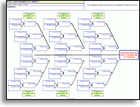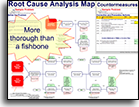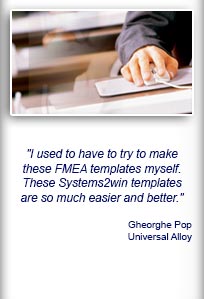Installation and Setup
Installation - Each User. Installation - Multi-user. Language Translations. Personalize Your Templates.Systems2win Training.
Quick Start Initial Training. New User Training. Training Matrix. Systems2win Leadership. Training Classes.Lean Training
Lean Training and Coaching. Lean Principles. Muda 8 Wastes. Goal - Lean Flow. Roadmap - Lean Journey. Value Stream Mapping. Standard Work. Hansei Lean Thinking. Lean Dictionary. Online Lean Training. Lean Leadership.Microsoft Office Training
Excel Training. Excel Drawings (without Visio). Excel Charts. Word Training. PDF Training. Document Storage and Naming.Support
Support.Root Cause Analysis Tools
Guidance to choose the right Root Cause Analysis Template
What is Root Cause Analysis?
The phrase 'Root Cause Analysis' is used to describe a variety of lean tools and methods
that each provide a systematic, teachable, coachable approach to identify root causes
(not just symptoms)
which can then be systematically eliminated, minimized, or (at least) detected using a variety of problem solving tools and lean management systems
When to do Root Cause Analysis

Whenever something goes wrong (or might go wrong)
that caused (or might cause) enough damage, pain, and cost
to justify investing a few minutes to ensure that it never happens (again)
Why use a Root Cause Analysis Template?
For the same reasons that you use any software
- To be legible
and understandable, even to stakeholders who didn't participate
- To socialize your results
with an Excel file or PDF that can be shared, discussed, and socialized
- To have a standardized process with helpful training
to remind your team of all factors to consider every time that you do root cause analysis

Which Root Cause Analysis Format?
These first three are the classic (and most popular) root cause analysis templates
Ishikawa Root Cause Analysis Fishbone Diagram

The most popular well-known tool for root cause problem solving
is the Ishikawa Fishbone Diagram (RootCause.xlsx)
It is the right tool to use when...
- You want it fast
Once you learn how to use this tool, it is lightning fast to use — even when facilitating a large group
- Your team is seeking root causes for one (and only one) well-defined problem
which can be succinctly stated in the fish head
- You want to be well-prepared to facilitate a time-effective brainstorming session
so (as the leader) you want to take the extra time to use the (optional) Systems2win feature to import already-known causes from your FMEA... so that your team can then brainstorm other possible causes... which can then be added to your FMEA and Control Plans to make sure that those newly-conceived possibilities never happen.
- This might be the only root cause analysis tool that your team has ever used
and you might not want to take the time to introduce your team to something new
Root Cause Analysis Map
The Root Cause Analysis Map (RootMap.xlsx)
is equally easy to use, and yet usually proves to yield more thorough analysis, and is therefore often a better choice for root cause analysis.

It is the right tool to use when...
- You want to be more thorough
Perhaps using the (optional) Problem Analysis section Perhaps using advanced features of the Countermeasures section
- You want to be consistent
Once your people learn how to use their Root Cause Map, it can be just about as fast as a Fishbone Diagram
- Your team is investigating root cause failure analysis for an incident
that caused enough damage to put your team in the spotlight of your high-level management... if not the press
Thought Map Relations Diagram

If you really don't know what to put in the fish head
because you're swimming in problems, and can't choose which one to focus on first...
then that's the time to consider using your
Thought Map Relations Diagram (RelationsDiagram.xlsx)
You might only use this template once in your career
but it might save your career when you do

More
Root Cause Analyisis Templates
These next templates have additional purposes, in addition to being extremely useful for root cause analysis
Pareto Chart

The bars on your Pareto Chart template (Pareto.xlsx)
show which things happen most frequently
(so that you can focus on root causes of your most common problems)
Scatter Plot

Use your Scatter Plot template (ScatterPlot.xlsx)
to look for a relationship
in graphed pairs of numerical data
Brainstorming Template

The decision of whether or not to use
your Brainstorming template (Brainstorming.docx)
is not an 'either / or' choice
A skilled facilitator will be ready to introduce a team
to diverse brainstorming methods
no matter which other tools or approaches are also being used
Gemba Interview Form

Why not ask the people who do the work every day?
Rather than just silently observing... and then huddling in a conference room to make guesses about root causes,
if you get in the habit of discussing skillful questions with the people that do the work, you will often find that they have useful intuitive insights and ideas.
8D Problem Solving

If your problem might involve other members of your supply chain
then your 8D Problem Solving template (8D.xlsx)
has a special feature to 'Generate a Working Document', so that you can circulate your root cause analysis problem solving document with your suppliers (and supply chain members that might not yet own a license for Systems2win)
Failure Modes and Effects Analysis (FMEA)
It has been said that "an FMEA is an 8D waiting to happen"

Rather than waiting to do post-mortem root cause analysis on accidents and incidents that have already inflicted damage...
a more competent team will get proactive...
and use their FMEA templates and systems to anticipate, minimize, and prevent potential risks
(and especially root causes of potential risks)
Five Whys Template

The simplest form of a root cause analysis tool
is to simply ask "Why?" several times
Your Systems2win templates don't include a Five Whys template
but you will find several free ones on the Internet
The right way to use a Five Whys PowerPoint template
is to create a succinct summary of the one most important Cause and Effect thread
that your team came up with as a result of using one of the (thorough) root cause analysis tools above.
The wrong way to use a Five Whys template
is to try to short-cut the process by following only 1 thread of Cause and Effect relationships
and then proudly proclaiming that you are "using lean methods"
Although there are rare situations where a problem is so simple that you might justifiably use this extremely abbreviated approach... but much more commonly... this would be an example of 'fake lean'.

Suggested Reading and Resources for
Root Cause Analysis Tools
- Root Cause Analysis - A Step by Step Guide, by Matthew Barsalou
- Root Cause Analysis - The Core of Problem Solving and Corrective Action, by Duke Okes
- Root Cause Analysis - Simplified Tools and Techniques, by Bjorn Andersen and Tom Fagerhaug

Use Excel Filter in your
Tool Selection Matrix
to choose the right
Process Improvement Tool
Download Free Trial
If your organization has
not yet provided a license,
download your free trial now

The right DMAIC tools
to Define, Measure, Analyze, Improve, and Control
the quality of ANY process
Own Yours Now
If your organization has
not yet provided a license,
own yours now
Training and Coaching
Consider Training and Coaching to support your teams to succeed

Training to get you started.
Tools you won't outgrow.
Schedule a Conference
Schedule a conference
to discuss your challenges
with an experienced lean advisor
Download Trial Now
Get a dozen trial templates,
and another dozen free gifts
@@@ Better conversion rate
if call to action is for a specific tool, and shows the image

Try It
Try this template
along with a couple dozen more
process improvement tools
Calls to Action Botttom
Related Topics
Related Topics section WITHOUT TESTIMONIALS
Replace this paragraph with menu library item for topics related to this video
Training and Coaching
Consider Training and Coaching to support your teams to succeed

Training to get you started.
Tools you won't outgrow.
Schedule a Conference
Schedule a conference
to discuss your challenges
with an experienced lean advisor
























